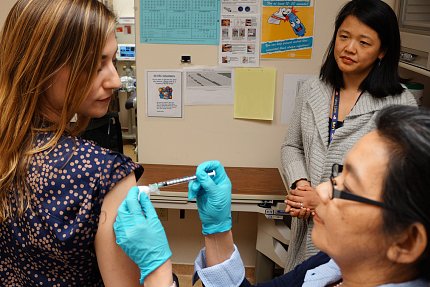First-in-Human Trial of a Universal Influenza Vaccine Candidate Begins

Photo: NIAID
The first clinical trial of an innovative universal influenza vaccine candidate is examining the vaccine’s safety and tolerability as well as its ability to induce an immune response in healthy volunteers. Scientists at NIAID developed the experimental vaccine.
Known as H1ssF_3928, the vaccine is designed to teach the body to make protective immune responses against diverse influenza subtypes by focusing the immune system on a portion of the virus that varies relatively little from strain to strain. The vaccine candidate was developed as part of a broader research agenda to create a so-called “universal” influenza vaccine that can provide long-lasting protection for all age groups from multiple influenza subtypes, including those that might cause a pandemic.
“Seasonal influenza is a perpetual public health challenge, and we continually face the possibility of an influenza pandemic resulting from the emergence and spread of novel influenza viruses,” said NIAID director Dr. Anthony Fauci. “This phase 1 clinical trial is a step forward in our efforts to develop a durable and broadly protective universal influenza vaccine.”
The trial, conducted at the Clinical Center, is being led by Dr. Grace Chen of NIAID’s Vaccine Research Center Clinical Trials Program. The trial will gradually enroll at least 53 healthy adults ages 18 to 70 years.
The first 5 participants will be ages 18 to 40 and will receive a single 20-microgram (mcg) intramuscular injection of the experimental vaccine. The remaining 48 participants will receive two 60-mcg vaccinations spaced 16 weeks apart. They will be stratified by age into 4 groups of 12 people each: 18 to 40 years, 41 to 49 years, 50 to 59 years and 60 to 70 years. Investigators hope to understand how participants’ immune responses to the experimental vaccine may vary based on age and the likelihood of their previous exposure to different influenza variants.
